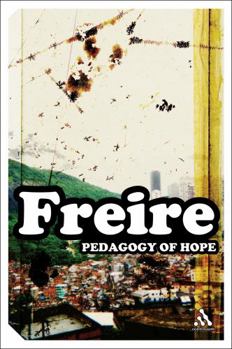Pedagogy of Hope: Reliving Pedagogy of the Oppressed
Select Format
Select Condition 
Book Overview
With Pedagogy of the Oppressed, Paulo Freire established his place in the universal history of education. Pedagogy of Hope represents a chronicle and synthesis of the ongoing social struggles of Latin America and the Third World since the landmark publication of Pedagogy of the Oppressed. Here, Freire once again explores his best-known analytical themes--with even deeper understanding and a greater wisdom. Certainly, all of these themes have to be...
Format:Paperback
Language:English
ISBN:0826477909
ISBN13:9780826477903
Release Date:December 2004
Publisher:Bloomsbury Academic
Length:224 Pages
Weight:0.57 lbs.
Dimensions:0.7" x 5.2" x 7.9"
Customer Reviews
2 ratings
A beautiful work!
Published by Thriftbooks.com User , 18 years ago
(If you have not read Freire's classic 1970 text, Pedagogy of the Oppressed, stop reading this review and go check it out. It is Freire's seminal masterpiece in which he envisions what he called a "liberatory" education--a brilliant theory of education for social change.) If you have read "Pedagogy of the Oppressed", then you *must* read this! In this wonderful work, Freire tells the story of how the first book came to be written and the journeys that the book has taken him on since. Throughout the tale, he also responds to a lot of the major criticism of the first book in a charitable and brilliant manner. The work's title also comes from a frequent motif in the book, the importance of maintaining hope in our often seemingly hopeless world--an argument that Freire makes beautifully. Overall, Freire's thoughtful and humble prose makes for a great read. There are great stories and great ideas for making our world a more beautiful one. I am guessing that the reader who put down the book as "self-important" and not "accessible" merely did not read the 1970 classic first. Go read that first if you haven't, but afterwards check out this! I'll leave you with a favorite passage from the work: "The idea that hope alone will transform the world, and action undertaken in that kind of naïveté, is an excellent route to hopelessness, pessimism, and fatalism. But the attempt to do without hope, in the struggle to improve the world, as if that struggle could be reduced to calculated acts alone, or a purely scientific approach, is a frivolous illusion."
A revealing work from a great educator and humanitarian.
Published by Thriftbooks.com User , 23 years ago
Sometimes it takes genius, and heart, to say what everyone already knows but can't quite vocalize. Education that takes the person's needs and social context into account; that helps him through dialog rather than imposing top-down curriculums in order to fit him to the rhythms of the dominant socioeconomic powers; that challenges him to think critically about his place in society and the world ("conscientization"); that encourages him to envision what he can do, where he can go....it took Paulo Freire not just to express these laudable goals, but to show us through his work how he actually helped accomplish them among people written off as inferior peasants with no voice in world affairs.Famous for his book PEDAGOGY OF THE OPPRESSED, kicked out of countries for daring to train farm workers and laborers in literacy and critical appraisal, Paulo Freire takes us behind the scenes and shows us what he was thinking, doing, and feeling throughout his long and radical career.Reading his other work, one might have guessed, say, that when he was much younger, the good doctor was blasted during a lecture on Piaget by a laborer who stood up and asked him on what side of town Freire lived and whether HIS household crammed several unwashed and hungry children into one room. But such anecdotes are of invaluable worth in showing how Freire learned what he learned--painfully. That the reader can sense in his wordplay that finally the man who'd done so much for others took this opportunity to wane autobiographical may cause a smile or two. But it shouldn't be mistaken for narcissism or pomposity. An activist and faithholder in people oppressed and in despair has earned the right to his eloquence, and it's nice to feel him enjoying it here and there. For the student of human nature, Freire's own (alas, briefly mentioned) childhood of poverty and early struggles will be of interest thanks to Freire's own take: that these didn't determine his later life so much as gave him tools with which to empathize with other marginalized people. Reading this, I thought of James Hillman's "acorn" notion: that the soul comes into life knowing what it needs, even if it needs unsparing adversity. To a man like Freire, adversity is not an "opportunity"--a manically cheery thesis--so much as the canvas from which he works.





